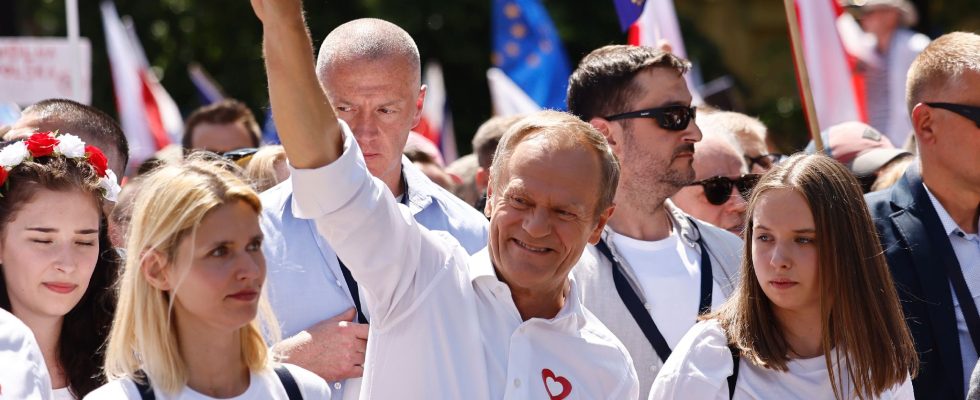As far as the eye can see, red and white flags, mixing with those of the European Union. Poland has not seen such massive demonstrations since the end of communism. In the streets of Warsaw, there were nearly 500,000 at the beginning of June, marching against the ultraconservatives in power. Then, on October 1, a huge crowd of a million people according to the organizers – 600,000 to 800,000 according to the independent news site Onet.pl – marched through the streets of the capital, hoping for political change during the legislative elections on October 15.
At their head, happy to have obtained such mobilization, Donald Tusk. “Democracy dies in silence,” said the leader of the main opposition party, the Civic Platform (PO), from his platform. “From today, there will be no more silence.” Since his official return to the Polish political scene in 2021, the former Prime Minister has been on a mission, at 66, for what appears to be his last fight: driving the Law and Justice party (PiS) from power and putting an end to the numerous attacks on the rule of law of which these nationalists have been guilty.
“The PiS has taken political control of most of the country’s institutions, in particular the judiciary, recalls Piotr Buras, director of the Polish office of the European Council for International Relations. State, but which does not appear as such because it was created over the years, thanks to their victories in the legislative elections of 2015 and 2019. If Donald Tusk does not manage to beat them, democratic institutions will be devastated for years, with PiS almost immovable from state structures.” An ambition claimed by their leader, Jaroslaw Kaczynski: “This time, no one will stop us!”
From rivalry to visceral hatred
The confrontation between this 74-year-old man, single and not very open to the world, and the liberal Donald Tusk has structured Polish political life since the beginning of the century. Beaten by Lech Kaczynski (Jaroslaw’s twin brother) during the 2005 presidential election, Tusk took resounding revenge two years later by winning the legislative elections, succeeding Jaroslaw as Prime Minister. The tragic death of Lech in 2010, in a plane crash that decapitated part of the Polish state apparatus, upon returning from a visit to Russia marked a breaking point. The brother, bruised, against the official investigation, has always considered that Tusk, with Vladimir Putin, had played a role in this crash.
Their rivalry has since turned into visceral hatred, with Kaczynski publicly calling Tusk “the personification of evil in Poland, pure evil.” “The entire PiS electoral campaign is based on hostility towards Tusk, negative propaganda hammered out by activists and on public television, which has become the party’s media arm for eight years,” notes Stanislaw Mocek, political scientist and rector from Collegium Civitas University. The former President of the European Council (2014-2019) is portrayed as a traitor to the nation for having concluded gas deals with Russia. He is also regularly described by his opponents as the “lackey of Germany” for his good understanding with former Chancellor Angela Merkel. A PiS senator, Jacek Bogucki, even assimilated in a tweet Tusk’s attitude resembles that of Hitler in the way they raise their arm in front of a crowd.
“The most violent campaign we have seen in thirty years”
“Over time, this speech has proven to be quite effective, many Poles believe in the PiS narrative,” notes Anna Paczesniak, professor at the department of European studies at the University of Wroclaw. But Tusk also plays the card of polarization and duel with Kaczynski to the fullest, which makes this campaign the most violent we have known in thirty years.” While resuming his anti-immigrant rhetoric, he does not hesitate to describe PiS as “evil”. As for his party, it presents Kaczynski as “a threat to your children, your family, your health and your wallet.”
On the economy, Tusk is leading a rather skillful campaign, breaking with the budgetary orthodoxy which led to the defeat of his camp in 2015. He proposed to vote this year for the revaluation of the family allowance, a campaign promise conservatives for 2024. He also pledged not to raise the retirement age, lowered by the PiS to 60 for women and 65 for men – Tusk had raised it to 67 in 2012, a measure for which he is still widely criticized. Above all, the sixty-year-old assures that he will release the 36 billion euros from the post-Covid fund that the European Union granted to Warsaw by complying with Brussels’ demands. The Polish recovery plan has been at a standstill for more than two years, with the PiS government struggling to maintain its controversial reform of the judicial system, despite injunctions from the Court of Justice of the EU.
However, nothing is won for Tusk. It seems unlikely that his center-right party will overtake the PiS, even if the gap is narrowing in the latest polls (30% against 34% for the PiS, according to the Kantar institute). But the liberal candidate could find common ground with two other parties, La Gauche and Troisième Voie (right). They must still exceed a threshold of 8% of votes, otherwise they will not obtain any seat in the Diet, the lower house of the Polish Parliament. “Tusk, aware that he should not take too many votes from them, seems to have concluded a non-aggression pact with them in recent weeks,” analyzes Anna Paczesniak. The demonstration in Warsaw gave the feeling that victory for his side was possible. All of Poland is now holding its breath.
